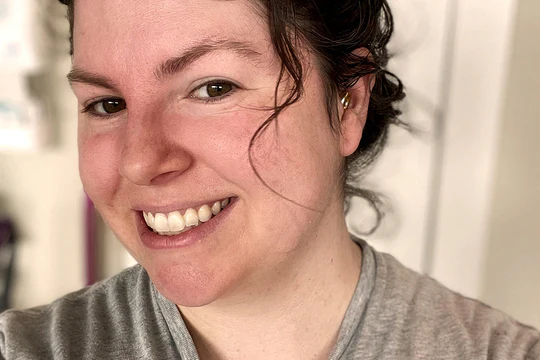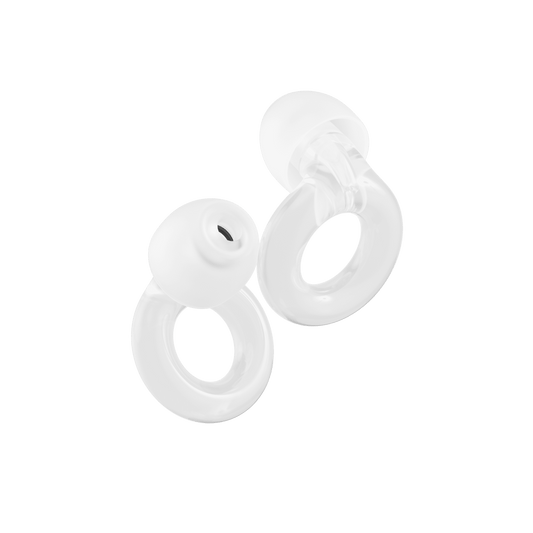Key takeaways
- Sensory overload is caused when one or more of your senses are overstimulated, so your brain struggles to process all the information it’s receiving
- It commonly coexists with many other conditions, including ADHD, autism and PTSD
- The best way to deal with sensory overload is to reduce the triggers in your environment
- This could include things like wearing earplugs if you have noise sensitivity, always having a plan of how to deal with episodes of sensory overload, and reducing your stress levels
Do you ever feel like you can’t focus when multiple conversations are happening at once? Do you get overwhelmed at parties, with loud music and flashing lights? You could be experiencing sensory overload. It can be difficult to deal with, but luckily, there are ways to manage it. Let’s take a look at how to cope with sensory overload, whatever symptoms you experience.

What is sensory overload?
First things first: what exactly is sensory overload?
It’s when one or more of your senses – touch, taste, smell, sight and sound – are overstimulated. That means they’re getting more input than your brain can process. When you’re overstimulated in this way, your brain struggles to process all the information it’s receiving, and is unable to filter out the information that’s less important.
This leads to feelings of discomfort and overwhelm, and can make it difficult to focus on anything. Most of us feel overstimulated in this way, but it can affect some people more than others.
Both adult sensory overload and overstimulation in children can be overwhelming to the point that it’s debilitating, and make life difficult on a day-to-day basis.
What causes sensory overload?
The human brain is an amazing and complex organ. Usually, it’s more than capable of interpreting all of the different information it receives from your body and your surroundings, and is able to tell you how to react.
But sometimes, when there’s lots of sensory information to interpret all at once, your brain can’t deal with it. Different things can trigger sensory overload in different ways for different people. Some of the most common causes are:
- Auditory
For some people, overstimulation happens when they’re surrounded by lots of different noises, particularly loud noises. That might happen when at a concert or in a nightclub, or at a big football game. It could also be as a result of hearing different sounds at once, for example trying to have a conversation with someone while there is background noise in a restaurant.
Imagine you’re sitting in a cafe, trying to enjoy your latte and your book. But there’s music playing. There’s a couple arguing loudly at the next table. A baby crying over there. The coffee machine is constantly hissing and whirring. Someone’s on a work call. And you can’t concentrate. Maybe you start to become agitated by all the different sounds.
If that sounds familiar, then you may be experiencing sensory overload, triggered by sounds.
- Touch
For others, it’s not noise but touch that leads to feelings of overwhelm. Certain fabrics, like velvet or cotton, might make you feel uncomfortable, or you might bristle when people touch you or brush by you.
If you’ve ever felt uncomfortable while standing on a crowded bus because strangers are pressed up against you, or someone brushes against your hand when trying to find a place to stand – your sensory overload may be triggered by touch.
- Light
Bright lights can be triggering for some people with sensory issues. This could be the glare of car headlights, flashing strobe lights in a theater show, or harsh strip lighting in an open-plan office or university library.
Picture the scene: You’re trying to get some work done but the lights are glaring above your head. You just can’t seem to focus on anything. Your head starts to hurt. Maybe you’re starting to feel fidgety, or you’re becoming restless. You may be feeling anxious or even angry. Your sensory overload could be triggered by light.
- Smell
Strong smells can cause sensory overload for some people. You might struggle with strong scents like perfume, cleaning products or certain foods – which could lead you to avoiding places where you might encounter these smells, like kitchens, bathrooms, or specific restaurants.
Maybe you can’t bear the smell of bleach, and actively avoid going into bathrooms and kitchens in case they’ve recently been cleaned. Or maybe you find filling your car up with gas a real chore, because the smell is so strong that you start to feel a bit funny. If any of these situations ring true for you, then you may have sensory issues that are triggered by smell.
- Taste
Specific foods can trigger sensory overload, usually ones with a very strong taste. Some people are also sensitive to food that is particularly hot or particularly cold.
Your child may be a picky eater. But they’re not just fussy – it’s that every time you give them broccoli, they gag or vomit. They might only want to eat very bland foods, or maybe they refuse to eat different types of food if they touch on the plate. All of these are signs of sensory overload that is triggered by taste.
Multi-sensory overload
Of course, you may find that more than one sense triggers your sensory overload – and if you experience multiple triggers simultaneously, it can feel incredibly overwhelming.
Let’s say you’re at after-work drinks. There are lots of people there, some of whom you know well, and some who you don’t know at all. There is music blasting out of the speakers, and people are chatting away to each other. Some are even singing along to the music. You might be struggling to hear what people are saying over the music, and you may be feeling a little anxious about speaking to new people anyway.
Then, it’s time for food and even though you’re really hungry, the smell of the food is overpowering to you. You can’t face eating, and you feel a little bit sick at the thought of it.
Then, it starts to get dark outside, so the lights inside get turned up. There are flashing disco lights and suddenly, it all feels too much for you. You need to leave the party – now.
Here, it’s a combination of different factors that has led to your sensory overload. It’s impacted your social interactions, made you feel unwell, and upset.
Symptoms of overstimulation
If you experience sensory overload or overstimulation, you might experience a range of different symptoms. They can be broadly divided into physical and emotional symptoms.
Emotional symptoms can include:
- Being irritable
- Difficulty concentrating or focusing
- Restlessness
- Discomfort
- Wanting to cover your ears
- Wanting to close or shield your eyes
- Feeling agitated
- Feeling stressed
- Feeling fearful
- Feeling angry or aggressive
Physical reactions can include:
- An increased heart rate
- Sweating
- Feeling light headed
- Insomnia
- Nausea
- Panic attacks
- Shaking
- Stomach aches
You might experience both physical and emotional reactions, or just one or the other, and you might experience most of these symptoms, or just a handful.
For some people, the symptoms of sensory overload are very intense and can be debilitating, while for others, symptoms are much more mild.
Conditions associated with sensory overload
While anyone can experience sensory overload, there are certain conditions that may make it more likely for someone to experience overstimulation, in adulthood and childhood.
- Autism
Research shows that sensory overload is extremely common in people with autism. In fact, it’s thought to affect anywhere from 69% to 93% of all adults and children with autism. Sensory overload is so common with autism that it’s included as part of the diagnostic criteria for autism spectrum disorder (ASD).
One study, looking at children with ASD and neurotypical children, found that the high prevalence of sensory overload in people with autism could be down to the fact that the brains of the autistic children didn’t adapt to repeated touch or sound.
In neurotypical people, sensory stimuli like noises, textures, smells and lights trigger something in the part of the brain that processes sensory information. If the noise, touch or smell keeps on going, the brain is able to tune it out, so that it can focus on any new information being received. This is a process called habituation, and it allows people to filter out sensations that are unimportant to them. They might know that there’s an ongoing noise in the background, or that they can still feel a scratchy wool sweater on our skin, but their brain allows them to turn down how loud that sensation is for them.
But, the study found, some autistic people don’t have this habituation, meaning they’re more sensitive to sensory stimulation.
That means people with autism can be particularly sensitive to their environments and what’s going on around them, which means they may struggle with sensory overload or hypersensitivity.
- ADHD
People with ADHD can also struggle with sensory overload, because their brains struggle to process lots of different sensory stimuli at once. If you have ADHD, this means that your brain may not be able to filter out the less important information so you can focus on what you need to – and that can leave you feeling overwhelmed and paralyzed.
One study found that people with ADHD are more likely to struggle with sensory input than people without ADHD – so if you do get sensory overload, know that you’re not alone!
Many of the symptoms of ADHD in themselves can also lead to sensory overload, or make it worse. These include:
- Inattentiveness
- Difficulty concentrating
- Difficulty self-regulation emotions
- Hyperactivity
- Hyper-focus
- Impulsiveness
- Lack of awareness of your environment
If you struggle with any of these symptoms, it makes it more likely that things like loud noises, bright lights or strong smells may creep up on you unexpectedly – leaving your brain unable to deal with the changes, and leaving you feeling upset or overwhelmed.
- Anxiety
General anxiety disorder and sensory overload seem to go hand-in-hand. If you already feel anxious, then you may be more prone to experiencing sensory overload in certain situations, like loud concerts or big groups of people. Additionally, if you’re feeling stressed and tired, this can make it more likely that you’ll react badly to sensory stimulation.
- Post-traumatic stress disorder
Post-traumatic stress disorder (PTSD) and sensory overload often co-exist. If you’ve suffered a traumatic event in the past, your brain is hypervigilant to the possibility of it happening again. A veteran with PTSD, for example, may experience sensory overload when they hear loud noises and bright lights.
Sensory overload can also be linked to medical conditions that cause physical pain, including:
- Fibromyalgia
Fibromyalgia is a condition which causes pain all over the body. It’s not known what causes fibromyalgia, but it’s thought that it’s down to certain chemicals in the brain and differences in the way the central nervous system processes pain messages.
People with fibromyalgia often experience sensory overload, although researchers are still working to establish what the link between the two is.
- Multiple sclerosis
Multiple sclerosis (MS) is a condition that affects the brain and spinal cord. It commonly causes symptoms like fatigue, difficulty walking, balance problems, vision problems, and problems with thinking and planning. It can also cause sensory overload. If you have MS, you might have trouble thinking or become confused when there’s too much noise around you.
How to know if you have sensory overload
Sensory overload isn’t an official disorder, so it’s not possible to get an official diagnosis. However, that doesn’t mean that you shouldn't speak to your healthcare provider if you’re experiencing symptoms of sensory overload. Many doctors do recognize it, particularly when it occurs alongside other conditions like ADHD and autism.
Before going to your doctor, it’s a good idea to keep a diary of when you experience sensory overload and what your triggers are, as it’s likely you’ll be asked about this.
How to deal with sensory overload in adults
So, now you know what it is and why it occurs, you might be wondering about a key question: how to reduce sensory overload? Let’s look at some key tactics for managing sensory overload, including whether you can stop it in its tracks, how to calm down from sensory overload when it does happen, and some strategies to reduce the impact it has on your life.
How to stop sensory overload
There aren’t many treatments for sensory overload. Most of the advice you’ll be given when it comes to how to handle sensory overload are around managing your condition, rather than preventing it completely.
However, some people may be prescribed medication for overstimulation, particularly if you also have a coexisting condition.
How to manage sensory overload
Typically, treatment is more about managing your sensory overload, and devising strategies that will help to reduce your chances of experiencing sensory overload, whether you need to take the edge off parenting, struggling to cope at work, or sensory issues are affecting your social life.
1. Identify your triggers
It might sound obvious, but the first step to improving your relationship with sensory stimuli is to identify what is triggering for you. Do you find yourself struggling with bright lights? Do loud music and big crowds send you into meltdown?
Once you’ve identified your triggers, you can start to understand what level of stimulation you’re comfortable with. It may be that you can handle noise up to a certain level, but live music concerts are too much. Or maybe you can handle groups of five or so people talking, but any more than that and it becomes unbearable to you.
Having a better understanding of what sensory overload means for you, whether it’s noise sensitivity, an aversion to bright lights, or touch-based, will help you to prioritize what changes you need to make in your life in order to better deal with it.
2. Make changes where you can directly control them
There are some situations in which you can reduce or remove your need to interact with your specific triggers. At home, for example, you could replace harsh strip lighting with floor-standing lamps to create softer mood lighting.
If you live in a house with other people, you could also create a quiet zone – somewhere you can go if everything feels a little too much. Think of it as your safe space.
3. Find ways to reduce overstimulation when you can’t directly control your environment
Although you can make some changes to your environment, it’s not really practical to just say ‘avoid your triggers’. What if you’re a parent and your kids trigger your sensory overload? Or what if you work in a cafe, but you’re triggered by constant background chatter?
When you can’t directly affect the environment you’re in, your best chance of avoiding the impact of sensory overload is to take action to reduce sensory stimulation.
For example, if you particularly struggle with noise sensitivity, you could wear earplugs like Loop Engage. They don’t completely remove all noise, but filter it instead to reduce the intensity. That means you can wear them while you’re working or out with friends and you’ll still be able to engage in conversations – the earplugs will just take the edge off all of the noises that are fighting for your attention.
If you struggle with sensory overload but love watching live music or going to clubs, you might find some solace in the Loop Experience earplugs. They’re designed to help you live in the moment, with up to 18 decibels of noise reduction and a patented acoustic channel and mesh that filters sound so you can hear your favorite music perfectly – just at a reduced volume.
4. Get better sleep
Often, lack of sleep leads to irritability. This, in turn, can cause you to react to sensory triggers that might not bother you otherwise. Getting enough sleep, and ensuring it’s high quality, can make a big difference when it comes to how you react to sensory stimuli.
Try to ensure good sleep hygiene by avoiding your cell phone and the TV before bedtime, ensuring your bedroom is dark and at a comfortable temperature, and avoiding big meals and caffeine before you go to sleep. You could also wear earplugs like Loop Quiet, which offer up to 24 dB of noise reduction and are made from soft silicone so they’re comfortable enough to wear all night long.
Our earplugs for sensory overload
5. Reduce stress
As with lack of sleep, if you’re stressed, it can make you less able to deal with sensory triggers that might otherwise not bother you.
Getting plenty of exercise is one of the best ways to keep your stress levels in check. The current Physical Activity Guidelines for Americans recommend that adults get 150 minutes of moderate intensity physical activity every week, and two days of muscle-strengthening activity.
You could also carve out time to focus on your hobbies. Knitting, painting, cooking and reading are all great stress-busters, as is listening to music and watching films. Make sure to find some time to focus on the things you love doing to reduce your sense of overwhelm and give you an endorphin boost.
6. Develop coping strategies
It’s important to have a toolkit of things that work for you, ready to pull out whenever you’re wondering how to calm sensory overload. This could include things like:
- Sticking to a routine to help you manage your stress and avoid unwanted sensory triggers
- Using fidget spinners to distract yourself and calm you down
- Finding like-minded people to talk to or joining a support group
- Speaking to your friends and family about your triggers and things they can do to help you, like opening a window if they’re cooking with strong-smelling food
- Speaking to your employer about things that can be done at work to reduce sensory overload, like working from home or in your own office space
- Learning breathing techniques that you can use to calm yourself down when you notice warning signs of a sensory episode
7. Have an action plan
It’s also a good idea to know what you’ll do if you do start to feel overstimulated or overwhelmed. How will you handle it? You could:
- Go shopping with a list so that you don’t get overwhelmed by all the different options
- Sit close to an exit when you go to the theater or a concert, so you can get out easily if you need to get away from it all for a moment
- Identify safe spaces ahead of time – if you’re attending a party, find out if there’s a quiet lobby or a garden you can go to if it all gets too much
- Ask people around you to reduce sensory triggers if possible, like turning off bright lights or turning down the music
- Remove yourself from the situation – remember, there’s never any shame in simply stepping away from it all to cut down on the stimulation your brain has to deal with
Being prepared with a plan may, in itself, be enough to help reduce your sensory overload, as you know that you’ll be in control and able to remove yourself from the situation or reduce the number of triggers if needed.
How to deal with sensory issues, sorted.
Sensory overload can be a lot. Whether you struggle with bright lights, loud noises, or something completely different, it can have a big impact on your quality of life. It can be particularly difficult to deal with if you also have another condition, like ADHD, autism or PTSD.
Knowing what your triggers are and how to deal with them can go a long way to reducing your sensory issues. From wearing earplugs to reduce the overall volume of background noise, to getting enough sleep and exercise, there are plenty of ways to calm sensory overload.
Learning how to cope with these things can take time, but they will get better. It might take a little trial and error to learn what solutions work for you, but remember, if you’re facing sensory overload, you’re definitely not alone.
If you’re struggling, always speak up – whether that’s to a trusted friend, family member, your employer, or your healthcare provider. It’s also a good idea to find like minded people who understand how you’re feeling, like in our Loop Community. A problem shared is a problem halved, after all!

5 Strategies For Coping With Sound Sensitivity
Discover 5 effective coping strategies to conquer sound sensitivity. Take control and find peace in a noisy world.

Autistic Traits & Sound Sensitivity - What are the traits of autism, and how ...
More and more people are being diagnosed with autism: about one in 160 children worldwide has an autism spectrum diso...

Sensory overload and kids during COVID - testimonial
COVID-19 has us all locked up inside, combining parenting, relation and work with little distraction. Sensory overloa...









